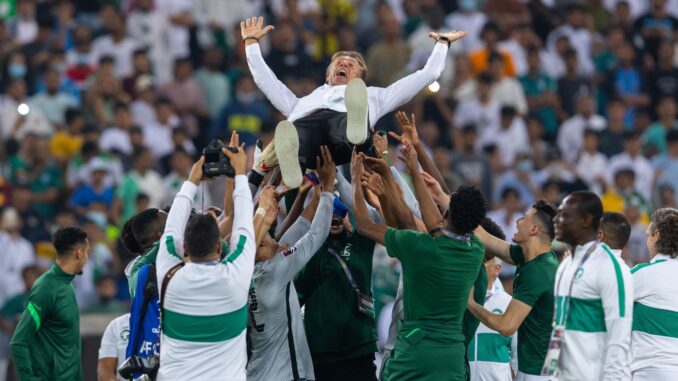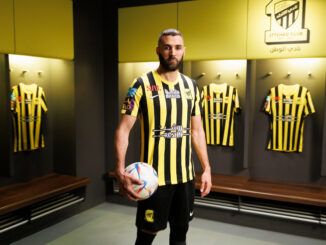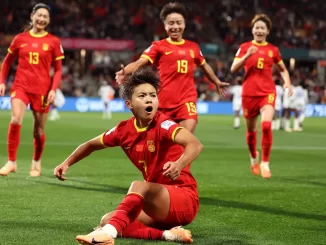

The Asian Game’s coverage of the FIFA World Cup Qatar 2022 is proudly sponsored by SMC.
Four years on from their now infamous 0-5 defeat to Russia that opened the FIFA World Cup in 2018, Saudi Arabia return to the global showpiece at the first time of asking, after a peerless qualification campaign was sealed back in March.
Following an absence of 12 years from the World Cup prior to Russia, Saudi Arabia’s immediate return following such heartbreak illustrates the strides being made in the Kingdom’s football, not only in the quality on the field but also in their mentality.
The manner of their qualification was nothing short of dominant; clinched with two games to spare, finishing above Asian heavyweights Japan and Australia, the latter for a second time in succession. Their progress from outsiders to heavy-hitters has been a steady but calculated redefinition.
The Renard Evolution
Their qualification campaign was a story of evolution rather than revolution; a journey that started at the final whistle on the pitch in Moscow that immortal day.
Despite that opening day demolition, Saudi Arabia went on to prove their level in Russia, competing well with Uruguay and Egypt in the remaining group stage matches. Yet it was apparent this was a team in mid-transition.
The Saudi Arabian Football Federation’s patience in the aftermath of their exit exemplified their growingly mature approach in returning to the pinnacle of Asian football.
The then under-fire coach Juan Antonio Pizzi, a man directed to instil his clear possession-based ideology, that struck hard against the typical Saudi Arabian football philosophy, was surprisingly, in some parts, kept on to continue his work in the aftermath of Russia.
Embed from Getty ImagesWhile he ultimately paid the price for failing to achieve the necessary results at the following AFC Asian Cup six months later, his stamp on the squad remains to this day.
His replacement, arguably the best coach outside Europe, Herve Renard, joined following a successful qualification to the 2018 World Cup with Morocco. His presence on the national team, which has grown over the last four years, has since honed a style and identity that modern Saudi Arabian football has come to represent.
Moulding the old with the new; the more direct, physical, wily style of football that had defined Saudi club football for decades, a style so successfully embraced by Dutch coach Bert van Marwijk in 2017, with Pizzi’s progressive, possession-based mentality; Renard has formed a team that can play both ways – either through you or against you, demonstrated by a mix of flying, eye-catching victories and hard-fought battles during qualification.
Early struggles lead to redemption
While Saudi Arabia emerged as group winners in the final stages of qualification above the likes of Japan and Australia, it wasn’t always a smooth ride, especially in the early days under Renard. Dropped points against Yemen and Palestine in their first three games caused concern, as did trailing to Uzbekistan with five minutes to go in their fourth matchday.
That last five minutes in Tashkent in the end proved a pivotal turning point in Renard’s early tenure in charge and how he sought to be distinctly different to his predecessors in responding to highly pressurised moments. To change up their play and trust their ability and nous to turn the tie on its head; the Saudis scored twice in the dying minutes to tip the group in their favour.
Emerging from a year’s break for COVID, which benefitted rather than hindered Renard’s progress in giving him time to establish his ideas, the free-flowing side of this team took advantage of home comforts in the round-robin fortnight to conclude the first half of qualification.
In winning all four of their remaining matches, scoring 14 without conceded a goal, Saudi Arabia strolled on to progress to the latter stages of qualification, emphatically putting to bed their early-stage wobbles.
While the Second Round had its drama, and something resembling a redemption narrative, the Third Round was surprisingly well managed in contrast. Effective when they needed to be, let off the leash when able, the game management of Renard came into its own.
While their competitors continued to slip in matches around them, the Green Falcons were imperiously effective, even in the matches where they lacked a solid run of form. Drawing 0-0 in Australia in January proved the defining point of their progress, a moment of realisation for those still in doubt that they had truly returned to the big leagues of Asian international football.
For Saudi football this now feels like home, however pre-Renard, the Saudis were at risk of drifting off into the periphery, incapable of forming an identity that could succeed in modern football.
Van Marwijk may have been able to paper over the cracks in qualifying for Russia, on the basis of spirit and an embrace of an old-fashioned, direct and quick style of football, but Renard arguably has the tools to cement their place at the world’s top table.
Newly established strengths
As has been harnessed over the last decade, the mentality of the squad has long been Saudi Arabia’s key strength, but their quality in possession has been something that has needed to develop over time.
An evolution of Pizzi’s sometimes high-risk, possession for possession’s sake mentality, Renard has clung to a more pragmatic impactful feel; no strict philosophy, in essence playing the right way at the right time. Simple in its message, highly difficult in its execution.
It must be accepted that the standard of footballer available to him has made this task much easier to achieve, built on the coming-of-age of a young cohort who were continental champions at U20 level in 2018, and most recently a new crop of talent that clinched the U23 Asian Cup title this summer.
The technical quality of Sami Al-Najaei and Abdullellah Al-Malki in central midfield has quietly kept this team ticking along in the middle of the park, while Abdulrahman Ghareeb and Khalid Al-Ghannam have provided glimpses of what an effective, more direct attacking ability this side has from out wide.
In defence, they have developed from a broadly rigid and arguably one-dimensional deep block to having a number of comfortable all-rounders who are as adept in possession as they are positionally.
Al-Nassr duo Abdulelah Al-Amiri and Abdullah Madu, alongside Al-Hilal’s Ali Al-Bulahi have all pushed the mantle forward with their ability to defend effectively whilst remaining critical to attacking build up play, a growing hall mark of Renard’s flexible game plan.
It’s no wonder that the absence of Hassan Tambakti, arguably the most competent defender for the coming generation, through the latter parts of qualification wasn’t an obvious gap in the side’s progress. Saudi Arabia accumulated six clean sheets from ten games without him in the final stages of qualification, underlying the strong foundations upon which this team is built.
Question marks remain in attack
The concern instead is higher up the pitch, as Renard continues to struggle in putting his finger on his preferred starting striker as we nearer the World Cup.
Saleh Al-Shehri has threatened in spells, but has struggled for a regular run of form, hampered by injury and competition for minutes with Al-Hilal over the last year.
Firas Al-Buraikan, arguably the most competent finisher in Saudi football at present, equally has question marks hanging over him, with some seeing him as a weak lone forward option, especially from the start, instead preferred as an effective, explosive option the bench.
His performance as the integral figure behind Saudi Arabia’s U23 Asian Cup triumph this summer, may have tipped the balance in his favour, due to a lack of alternative options if anything else.
Renard’s lack of options has even seen him extend the invite back to the enigmatic Haroune Camara. The young striker, now at Al-Ittihad, has had a turbulent last few years, from being seen as the missing piece in the Saudi jigsaw to a striker who barely resembles a top flight option.
His talent is unquestionable but his potency has been worryingly erratic. As a sporadic, bolter from the pack, heading into a second World Cup in succession however, he does look like the most exciting attacking option available.
As a whole, with adequate support from Salem Al-Dawsari and others being in significant supply behind the leading striker, the question instead may be which centre forward can best accommodate the diamonds of the team, rather than one who is productive in their own right.
Four years on, will we see improvement?
The other question mark surrounds experience: how much further forward is this squad than four years ago?
Ahead of Russia, the brief and ultimately fruitless exercise of sending talent to Europe to a range of substitute benches across La Liga failed to muster the results desired. Four years later, not one player has made inroads into European football again, creating somewhat of a bottleneck domestically amongst a growing crowd of foreign talent in the Saudi Pro League.
This crowded marketplace is something of which Renard is acutely aware:
“There are many foreign players in each club in the league, which makes my job a bit more difficult,” Renard told the AFC website earlier this year.
With the Saudi Pro League increasing foreign player quota numbers this season, concern for adequate minutes of those likely to be in and around the squad is only going to grow as we creep closer to the World Cup.
The likes of Al-Dawsari, Fahad Al-Muwallad and Salman Al-Faraj remain the difference makers to this team who, to their credit, regularly deliver in a Saudi shirt, but their lack of high-level experience could be a decisive mitigating factor once the World Cup rolls around, as all three have experienced at different times at the Olympics and the Club World Cup over the last two years.
To sign off a look back on Saudi Arabia’s World Cup qualification campaign on a negative note, however, would be highly unjust. Following a near faultless four-year cycle, that only South Korea have matched in terms of consistency, Renard and his side deserve significant praise.
The adaption of old and new styles into his very own vision of the Saudi national team, alongside individual playing quality that is about to hit their peak, the realisation after years of work looks set to pay off.
Saudi Arabia, ironically, have become the mirror image of what they always fought against, a team of patience, consistency and above all, effectiveness.
PHOTO: twitter/SaudiNT
Listen to Episode 91 of The Asian Game Podcast as we discuss the latest saga engulfing Iran ahead of the FIFA World Cup




